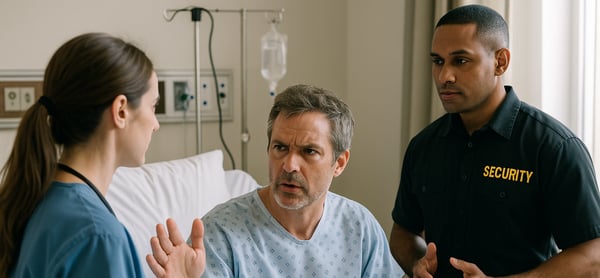The moment a patient first encounters you may determine not only their experience, but the trajectory of their entire care journey. Here's how the Universal Greeting can revolutionize your approach to patient interactions while building the foundation for successful Non-Escalation.
Posts about Education (2)
Preventing Medical Errors Through Effective Communication Strategies
Healthcare organizations face a sobering reality: communication failures are among the leading causes of preventable medical errors, contributing to patient harm, increased costs, and damaged reputations. With over 400,000 hospitalized patients experiencing preventable harm annually and healthcare costs of medical errors ranging from $20-45 billion per year, the urgency for systematic...
Breaking Bad News: Compassionate Communication Techniques—Podcast
“Breaking Bad News: Compassionate Communication Techniques” — Episode 34
Co-host: Marcus—former healthcare security director
Co-host: Natalie—nurse practitioner and clinical team leader
Subscribe to our podcast on Apple Podcasts or Spotify
Trauma-Informed Care: Approaching Sensitive Patient Interactions
In healthcare settings, every interaction carries the potential to either heal or harm. Even a routine medical encounter can quickly transform from a healing opportunity into a re-traumatizing experience. As healthcare professionals, understanding trauma-informed communication isn't just beneficial—it's essential for providing compassionate, effective care that honors the dignity of every...
Verbal De-escalation: Essential Skills for Healthcare Professionals
Healthcare environments are high-pressure settings where emotions can run high and tensions can escalate quickly. With 76% of emergency room nurses reporting experiences with workplace violence and The Joint Commission noting a consistent increase in violence-related incidents over the past five years, the ability to prevent escalation when able and de-escalate situations verbally when necessary...
Why Compliance Training Won't Save Your Reputation
Healthcare organizations invest heavily in regulatory compliance training—from annual workplace violence prevention modules to harassment awareness courses. Administrators track completion rates, verify documentation, and prepare for surveys with meticulously maintained records. When regulators visit, these training programs provide evidence of "reasonable efforts" to address workplace safety...
Situational Awareness: Your First Line of Defense in Healthcare—Podcast
“Situational Awareness: Your First Line of Defense in Healthcare" — Episode 33
Co-host: Marcus—former healthcare security director
Co-host: Natalie—nurse practitioner and clinical team leader
Subscribe to our podcast on Apple Podcasts
How Much is Conflict Costing You?
Healthcare leaders track countless financial metrics—from length of stay and operating margins to supply costs and reimbursement rates. Yet one of the largest cost drivers in healthcare remains largely unmeasured and unmanaged: workplace conflict.
When 'Nonviolent' Isn't Enough: Redefining the De-escalation Standard
Healthcare organizations have embraced de-escalation training as a cornerstone of workplace violence prevention. These programs typically aim to prevent physical aggression through verbal and non-verbal techniques that calm agitated individuals. Success is often defined simply: if no one gets hurt, the de-escalation is deemed successful.
Incident Reporting Isn't Enough: What Your Team Isn't Telling You
Healthcare organizations rely heavily on incident reporting systems to identify and address safety concerns, including workplace violence. These systems typically capture serious events like physical assaults, sexual harassment, or explicit threats. Organizations track these reports, analyze trends, and implement targeted interventions based on the resulting data.
But what about all the events...











